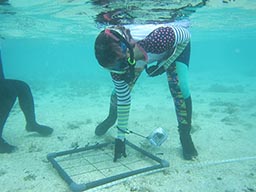- ABOUT US
- PROGRAM AREAS
- CONSERVATION APPROACH
- EDUCATION
- MULTIMEDIA
- Public Meeting 1: February 8, 2018
The provisional committee’s first meeting will be on February 8 in Washington, DC. It will include an open public session from 1:00-5:00 p.m. ET. The session will feature perspectives from NOAA and other stakeholders. The provisional commitee is open for public comment until February 6, 2018. Click here for more details and to register. - Public Workshop: Interventions to Increase the Resilience of Coral Reefs
May 31, 2018 - June 1, 2018
Location: University of Miami Rosenstiel School of Marine and Atmospheric Science
4600 Rickenbacker Causeway Miami FL 33149
Click here for more details and to register. - Public Meeting 3: Summer 2018 - TBD
- Public Meeting 4: Winter 2018/2019 - TBD
New Committee Announced for Study on Coral Reef Resilience
February 1, 2018

In January, the National Academies of Sciences, Engineering, and Medicine appointed a new committee to conduct a study on interventions to increase the resilience of coral reefs. The provisional committee includes international experts who cover a range of expertise.
Climate change is increasingly threatening coral reefs across the globe, causing mass coral bleaching events and disease outbreaks. A growing body of scientific literature has explored novel ecological and genetic interventions that have the potential to enhance the recovery and persistence of coral reefs threatened by rapidly deteriorating environmental conditions.
Over the next year, the committee will evaluate research of novel intervention strategies and the potential ecological benefits and risks associated with each. Their findings will include a decision-making framework and recommendations on the most promising paths forward, both for further research and implementation.
Public input will play a critical role in this study and efforts to enhance coral resilience. The committee will host four public meetings to solicit input. Scientists, managers and concerned citizens are encouraged to attend and share their opinions, research, observations from field work or other testimony.
To learn more about this study, and for information on the public meetings, please visit the National Academies’ web page on Interventions to Increase the Resilience of Coral Reefs. This study is sponsored by NOAA.
Public Meeting Information
Please check back for more information on the public meetings as it becomes available.
Related Stories:
Climate, reefs and resilience: Locally-based strategies to address a global issue
Reef Resilience (podcast)
Can a coral reef recover from bleaching and other stressful events?
About Us

The NOAA Coral Reef Conservation Program was established in 2000 by the Coral Reef Conservation Act. Headquartered in Silver Spring, Maryland, the program is part of NOAA's Office for Coastal Management.

The Coral Reef Information System (CoRIS) is the program's information portal that provides access to NOAA coral reef data and products.
Work With US
U.S. Coral Reef Task Force
Funding Opportunities
Employment
Fellowship Program
Contracting Assistance
Graphic Identifier
Featured Stories Archive

Access the archive of featured stories here...
Feedback
Thank you for visiting NOAA’s Coral Reef Conservation Program online. Please take our website satisfaction survey. We welcome your ideas, comments, and feedback. Questions? Email coralreef@noaa.gov.
Stay Connected
Contact Us
NOAA’s Coral Reef Conservation Program
SSMC4, 10th Floor
1305 East West Highway
Silver Spring, MD 20910
coralreef@noaa.gov
